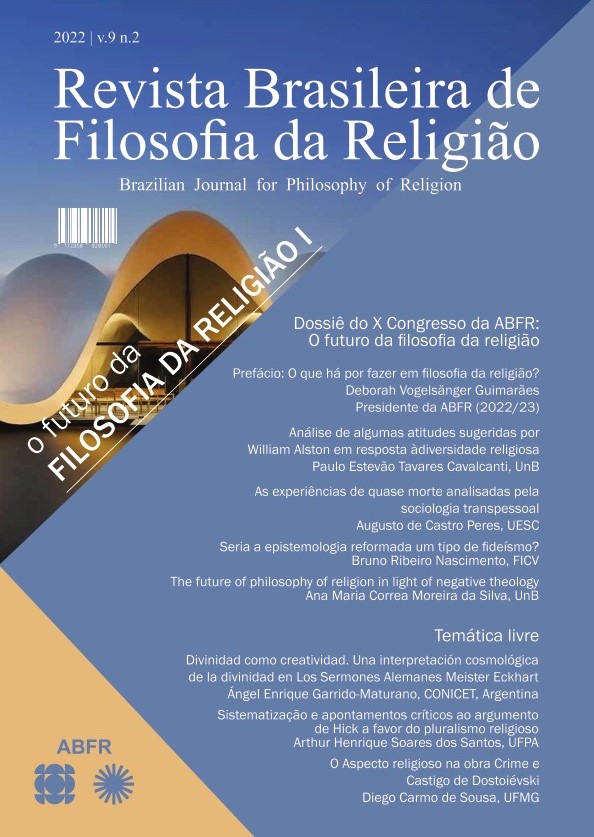Is reformed epistemology a form of fideism?
DOI:
https://doi.org/10.26512/2358-82842022e52175Keywords:
Epistemologia Reformada, Teísmo, Fideísmo, Epistemologia Religiosa, EvidencialismoAbstract
The aim of this article is to assess whether Reformed epistemology is to be regarded as a form of fideism. Reformed epistemology holds the philosophical thesis that belief in God can be intellectually justified, rational or warranted, even if there is no evidence for the existence of God. First, I will detail the position of Reformed epistemology in order to understand how theistic belief can be intellectually successful despite a lack of evidence or proof. I will then look at the concept of fideism and explain how this position is a reproach or criticism of Reformed epistemology. Finally, I will examine whether it is correct to describe Reformed epistemology as a variant of fideism.
References
ALSTON, WILLIAM (2020). Percebendo Deus. Natal: Carisma.
AMESBURY, R. (2007). “Fideism” in Stanford Encyclopedia of Philosophy.
BARRETT, J. (2012). Born Believers: the science of children’s religious belief. Nova
York: Atria Books.
BOLOS, A.; SCOTT, K. (2015). “Reformed Epistemology” in Internet Encyclopedia of
Philosophy. Available on the internet at https://iep.utm.edu/ref-epis/, accessed 2024.
CLARK, K. J. (1990). Return to Reason: a critique of enlightenment evidentialism and a
defense of reason and belief in God. Grand Rapids, Michigan: William B. Eerdmans
Publishing Company.
CLARK, K. J. (2019). God and the Brain: the rationality of belief. Grand Rapids,
Michigan: William B. Eerdmans Publishing Company.
CRAIG, W. (2012). Apologética Contemporânea: a veracidade da fé cristã. São Paulo:
Vida Nova.
CRAIG, W. L.; MORELAND, J. P. (eds.) (2009). The Blackwell Companion to Natural
Theology. Wiley-Blackwell.
GEISLER, NORMAN (2002). Enciclopédia Apologética. São Paulo: Vida.
HASKER, W. (2006). “Evidencialismo” in AUDI, R. (Org). Dicionário de Filosofia de
Cambridge. São Paulo: Paulus.
MACKIE, J. L. (1982). The Miracle of Theism: arguments for and against the existence
of God. New York: Oxford University Press.
MCINERNY, R. (1981). “Reflection on Christian Philosophy” in 100 Years of Thomism.
University of St. Thomas, Houston: 63-73.
MEYER, S. (2022). O Regresso da Hipótese de Deus: três descobertas científicas que
revelam a mente por trás do universo. Lisboa: Edições 70.
NASCIMENTO, B. R. (2023). Deus é uma hipótese científica? Unus Mundus, Belo
Horizonte, 2, Jul-Dez, 2023. Available on the internet at https://
unusmundus.academiaabc2.org.br/deus-e-uma-hipotese-cientifica/, accessed 2024.
PENELHUM, T. (1983). God and Skepticism: A Study in Skepticism and Fideism.
Boston: Reidel Publishing Co.
PENELHUM, T. (2019). “Fideísmo” in Crítica na Rede. Available on the internet at
https://criticanarede.com/fideismo.html, accessed 2024.
PLANTINGA, A. (1983). “Reason and Belief in God”. in PLANTINGA, A.;
WOLTERSTORFF, N. (eds.), Faith and Rationality: reason and belief in God.
University of Notre Dame Press: 16-93.
PLANTINGA, A. (2001). “Swinburne and Plantinga on Internal Rationality”. Religious
Studies, 37 (3): 357-358.
PLANTINGA, A. (2016). Conhecimento e Crença Cristã. Brasília: Monergismo.
PLANTINGA, A. (2018a). Crença Cristã Avalizada. São Paulo: Vida Nova.
PLANTINGA, A. (2018b). Ciência, Religião e Naturalismo: onde está o conflito? São
Paulo: Vida Nova.
PLANTINGA, A. (2018c). “Two Dozen (or so) Theistic Arguments” in WALLS, J.;
DOUGHERTY, T. (eds.) (2018). Two Dozen (or so) Arguments for God. Oxford
University Press.
QUINN, P. L. (1985). “In Search of the Foundations of Theism”. Faith and Philosophy,
(4): 469-486. Available on the internet at https://place.asburyseminary.
edu/faithandphilosophy/vol2/iss4/11, accessed 2024.
REID, T. (2013). Investigação sobre a Mente Humana Segundo os Princípios do Senso
Comum. São Paulo: Vida Nova.
RULOFF, C.; HORBAN, P. (eds.) (2021). Contemporary Arguments in Natural
Theology: God and rational belief. Bloomsbury Publishing.
RUSSELL, B. (1977). Fundamentos de Filosofia. Rio de Janeiro: Zahar.
RUSSELL, B. (2014). Por que Não Sou Cristão e Outros Ensaios a Respeito de Religião
e Assuntos Afins. Porto Alegre: LP&M.
SWINBURNE, R. (2019). Existência de Deus. Brasília: Monergismo.
WOLTERSTORFF, N. (1983). “Can Belief in God Be Rational if it Has no Foundations?
in PLANTINGA, A.; WOLTERSTORFF, N. (eds.), Faith and Rationality: reason and
belief in God. University of Notre Dame Press: 16-93.
WOLTERSTORFF, N. (2001). Reformed Epistemology. in PHILLIPS, D. Z.; TESSIN,
T. (eds.), Philosophy of Religion in the 21st Century. Palgrave: 39-63.
WOLTERSTORFF, N. (2011). “Reason and Trust in Reid”. Canadian Journal of
Philosophy, 41 (S1), 183-196. Available on the internet at https://www.cambridge.org/
core/journals/canadian-journal-of-philosophy/article/abs/reason-and-trust-in-reid/
BD59FD5E7A2D718B774181C7B82210C, accessed 2024.
WOLTERSTORFF, N. (2023). Discurso Divino: reflexões filosóficas sobre a tese de que
Deus fala. Viçosa: Ultimato
Downloads
Published
Issue
Section
License
Copyright (c) 2024 Brazilian Journal for Philosophy of Religion

This work is licensed under a Creative Commons Attribution 4.0 International License.

